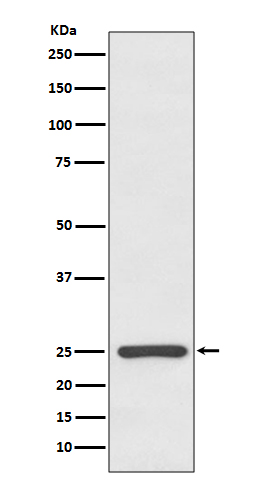
| WB | 咨询技术 | Human,Mouse,Rat |
| IF | 1/20-1/50 | Human,Mouse,Rat |
| IHC | IHC:1/100-1/200;IHF:1/50-1/200 | Human,Mouse,Rat |
| ICC | 1/50-1/200 | Human,Mouse,Rat |
| FCM | 咨询技术 | Human,Mouse,Rat |
| Elisa | 咨询技术 | Human,Mouse,Rat |
| Aliases | HCAK1; Ig kappa chain C region; IGKCD; Immunoglobulin InV;;Human Ig kappa light chain |
| WB Predicted band size | Calculated MW: 12 kDa ; Observed MW: 25 kDa |
| Host/Isotype | Rabbit IgG |
| Antibody Type | Primary antibody |
| Storage | Store at 4°C short term. Aliquot and store at -20°C long term. Avoid freeze/thaw cycles. |
| Species Reactivity | Human |
| Immunogen | A synthesized peptide derived from human Human Ig kappa light chain |
| Formulation | Purified antibody in PBS with 0.05% sodium azide,0.05% BSA and 50% glycerol. |
+ +
以下是关于κ轻链(kappa light chain)抗体的3篇参考文献,包含文献名称、作者及摘要概括:
---
1. **文献名称**: *"Development of a novel immunoassay for the detection of free immunoglobulin light chains in serum"*
**作者**: Bradwell AR, et al.
**摘要**: 该研究开发了一种新型免疫比浊法检测血清中的游离κ/λ轻链,用于多发性骨髓瘤和轻链淀粉样变性的诊断。研究验证了抗体的高特异性,并证明其较传统电泳法更敏感。
2. **文献名称**: *"Clinical utility of serum free light chain analysis in the diagnosis and monitoring of monoclonal gammopathies"*
**作者**: Dispenzieri A, et al.
**摘要**: 文章系统评估了κ/λ轻链抗体在单克隆丙种球蛋白病(如多发性骨髓瘤)中的临床应用,强调游离轻链比值(κ/λ)在疾病诊断和疗效监测中的价值。
3. **文献名称**: *"Automated κ/λ free light chain assay: analytical performance and clinical utility in plasma cell disorders"*
**作者**: Katzmann JA, et al.
**摘要**: 研究验证了一种自动化κ/λ轻链检测方法的分析性能(灵敏度、特异性),证明其能有效鉴别单克隆与多克隆轻链增多,并指导浆细胞疾病的早期干预。
---
**备注**:上述文献均聚焦于κ轻链抗体的检测技术开发及临床转化,实际引用时建议通过PubMed或Web of Science检索原文并核对细节。如需更具体领域的研究,可补充关键词(如“治疗应用”或“特定疾病”)进一步筛选。
The kappa light chain antibody is a critical reagent in immunology and clinical diagnostics, specifically targeting the kappa (κ) light chain of immunoglobulins. Antibodies (immunoglobulins) are composed of two heavy chains and two light chains, with light chains existing as either kappa or lambda (λ) types. In humans, approximately 60% of antibodies carry kappa light chains, while 40% have lambda chains. This ratio is often disrupted in clonal B-cell or plasma cell disorders, making kappa light chain antibodies essential for identifying such abnormalities.
In research, these antibodies are widely used in techniques like immunohistochemistry (IHC), flow cytometry, and Western blotting to detect κ light chain expression, aiding in the characterization of B-cell lineages, lymphoid tissues, or plasma cell neoplasms. Clinically, they are pivotal in diagnosing and monitoring conditions like multiple myeloma, lymphoma, or autoimmune diseases. For example, an abnormal κ:λ ratio in serum or urine often indicates monoclonal gammopathies. Additionally, κ-specific antibodies help distinguish between polyclonal (reactive) and monoclonal (neoplastic) proliferations, guiding treatment decisions.
Commercial kappa light chain antibodies are typically monoclonal, ensuring high specificity. Their development and validation have significantly advanced precision in hematopathology and immunology, underscoring their role in both basic science and translational medicine.
×